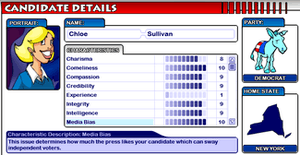The Political Machine
| The Political Machine | |
|---|---|
 | |
| Developer(s) | Stardock |
| Publisher(s) | Ubisoft |
| Platform(s) | Microsoft Windows |
| Release date(s) |
|
| Genre(s) | Government simulation |
| Mode(s) | Single-player, Multiplayer |
The Political Machine is a government simulation game from Stardock and the first game in the Political Machine series, in which the player leads a campaign to elect the President of the United States. The player accomplishes this goal by traveling from state to state and engaging in a variety of activities to either raise money or raise poll numbers.
Each game starts with the selection of a pre-created candidate or creation of a fictional candidate from one of the two major American political parties, the Republican Party and the Democratic Party.
Headquarters and fundraisers are possible, the effectiveness of which depends on various factors.
When enough money is accumulated the player can "invest" it in advertisements (either through newspapers, radio, or TV media). The effectiveness of these ads are determined by several factors. For instance, an ad supporting tax cuts will work better with Republican Texas than with Democratic Massachusetts.
A key factor in the game is the concept of "Stamina" and "Turns." In each turn (representing one week), a candidate has a set amount of stamina to engage in activities. For example, establishing or upgrading a campaign HQ costs more stamina than creating a newspaper ad.
A sequel, The Political Machine 2008, was released June 16, 2008, with new characters introduced, such as Barack Obama and John McCain.
A second sequel, The Political Machine 2012, was released July 31, 2012, with new characters introduced, such as Mitt Romney and Rick Santorum.
A third sequel, The Political Machine 2016, was released February 4, 2016, with new characters introduced.
Candidates
Basic candidates
Democrats

- Bill Clinton
- Hillary Clinton
- John Edwards
- Al Gore
- Jeffory Jackson (fictitious character based on politician and 1984 and 1988 presidential candidate Jesse Jackson)
- John Kerry
- Chloe Sullivan (fictitious character, possibly named after a character from the television series Smallville)
- Tom Vilsack
Republican
- Barbara Bush
- George H. W. Bush
- George W. Bush
- Laura Bush
- Dick Cheney
- Mike Forbes (fictitious character based on 1996 and 2000 presidential candidate Steve Forbes)
- Bill Mason (although there is a Bill Mason, he is not related to politics. The computer game character is based on the 1996 Republican presidential Nominee Bob Dole)
- Condoleezza Rice
- Arnold Schwarzenegger
Unlockable candidates
These candidates have to be defeated by a member of the opposite party in Campaign Mode in order to unlock them.
Democrat
- Wesley Clark
- Jimmy Carter
- Bill Richardson
- Dick Gephardt
- Lyndon B. Johnson
- Woodrow Wilson (mislabeled as from Georgia. Although he spent much of his childhood there, Wilson was elected from New Jersey, where he served as governor.)
- Franklin D. Roosevelt
- Thomas Jefferson (member of the Democrat-Republicans, predecessors to the Democrats)
Republican
- William Taft
- Gerald Ford
- Ulysses S. Grant
- Richard Nixon
- Theodore Roosevelt (mislabeled as from Ohio)
- Ronald Reagan
- Abraham Lincoln
- George Washington (sympathetic to the Federalists, predecessors to the Whigs, and in turn the Republicans)
Reception
| Reception | ||||||||||||||||||||||||||||||
|---|---|---|---|---|---|---|---|---|---|---|---|---|---|---|---|---|---|---|---|---|---|---|---|---|---|---|---|---|---|---|
| ||||||||||||||||||||||||||||||
The game received "average" reviews according to video game review aggregator Metacritic.[1]
References
- 1 2 "The Political Machine for PC Reviews". Metacritic. Retrieved December 23, 2014.
- ↑ 1UP staff (October 28, 2004). "[The] Political Machine". 1UP.com. Retrieved April 24, 2016.
- ↑ Geryk, Bruce (November 2004). "The Political Machine" (PDF). Computer Gaming World (244): 84. Retrieved April 24, 2016.
- ↑ "The Political Machine". Game Informer (139): 167. November 2004.
- ↑ Ferris, Duke (September 3, 2004). "The Political Machine Review". Game Revolution. Retrieved December 23, 2014.
- ↑ Todd, Brett (August 18, 2004). "The Political Machine Review". GameSpot. Retrieved December 23, 2014.
- ↑ Chick, Tom (August 24, 2004). "GameSpy: The Political Machine". GameSpy. Retrieved December 23, 2014.
- ↑ McElfish, Carlos (August 25, 2004). "The Political Machine - PC - Review". GameZone. Archived from the original on April 17, 2008. Retrieved December 23, 2014.
- ↑ McNamara, Tom (September 20, 2004). "The Political Machine Review". IGN. Retrieved December 23, 2014.
- ↑ "The Political Machine". PC Format (167). November 2004.
- ↑ "The Political Machine". PC Gamer: 96. December 2004.